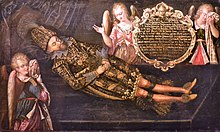Franz (Pomerania)
Franz von Pommern (born March 24, 1577 in Barth ; † November 27, 1620 in Stettin ), sometimes referred to in older literature as Franz I of Pomerania , was Duke of Pomerania- Stettin and Bishop of Cammin .
Life
Franz was the son of Duke Bogislaw XIII. and Klara von Braunschweig-Lüneburg. At the instigation of his father, he received the best possible training and showed early that his interests tended to chivalry and military affairs. His plans to go to the court of Electoral Saxony were prevented by Johann Friedrich , who brought him to the diocese of Cammin. Appointed coadjutor of the diocese in 1592 , he took part in the national synod in 1593. In 1594 he traveled to Vienna and Hungary. Under the later Archduke Matthias of Austria, he took part in the siege of the Gran Fortress . He then went to Italy and returned to Pomerania in 1596.
After his uncle Casimir renounced the diocese of Cammin, he was installed as bishop in the cathedral church of Cammin in 1602 after a previous election. His residence was Köslin , where he had the castle equipped accordingly.
When in 1604 the King of Sweden in the Swedish-Polish War offered him the command of 1,000 mounted and 3,000 foot troops, he had to refuse in view of the neutrality of Pomerania.
In 1607 he went on another trip. This led him first to Prague and from there via Switzerland to France to the Spanish border. He returned via England, Scotland and the Netherlands. In 1614 he set up a small military force to secure the borders of his diocese. After his brother Philip II died in 1618 without heirs, he followed him in the government of Pomerania-Stettin. The office of Bishop of Cammin went to his brother Ulrich .
His efforts to strengthen the defense capacity of Pomerania were largely unsuccessful because of the resistance of the estates. They refused the demand to provide the Stettin armory with weapons and equipment, and also refused a draft advertised by Pützerlin in November 1619 .
He did not share the scientific interests of his predecessor Philip II. Work on geographical or regional historical works such as the Pomeranographia by Valentin von Winther found little support from him. In contrast, he devoted himself intensively to government affairs and the city of Szczecin. He always carefully checked documents to be signed. Because of his affable and kind manner, he was very popular with the people.
During Duke Franz's term of office, the witch trial against 80-year-old Sidonia von Borcke from the Marienfließ monastery took place . She was accused of the early deaths of Dukes Philip II and George and the childlessness of the other sons of Bogislaw XIII. to have brought about through witchcraft. The defendant was eventually sentenced to death and executed. Three months later, Duke Franz, who was still healthy in the morning, fell ill after lunch and died a few days later. His marriage to Sophie von Sachsen (daughter of the Elector Christian I ) in 1610 remained childless.
literature
- Ute Essegern: I made up my mind to advertise. The marriage between Duke Franz of Pomerania-Stettin (1577–1620) and Sophia of Saxony (1587–1635). In: Pomerania. Journal of Culture and History. Volume 43 (2005), Issue 1, pp. 27-35.
- Herrmann Müller: Franz I. In: General German Biography (ADB). Volume 7, Duncker & Humblot, Leipzig 1877, p. 292 f.
Web links
| personal data | |
|---|---|
| SURNAME | Franz |
| ALTERNATIVE NAMES | Franz I. |
| BRIEF DESCRIPTION | Duke of Pomerania-Stettin, Bishop of Cammin |
| DATE OF BIRTH | March 24, 1577 |
| PLACE OF BIRTH | Barth |
| DATE OF DEATH | November 27, 1620 |
| Place of death | Szczecin |



